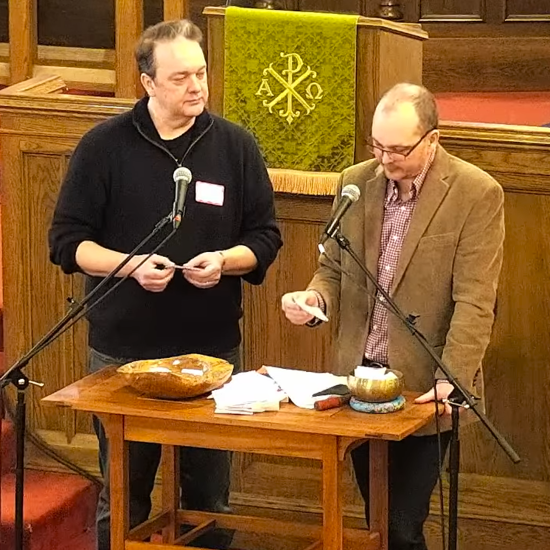
(RNS) — When he arrived at Christ Episcopal Church, a suburban congregation outside Cleveland, in September 2024, the Rev. Charles Graves IV said, one of his first encounters with a parishioner was a word of caution about the membership’s take on a key point of theology. “You know, we don’t teach penal substitutionary atonement here,” Graves recalled the parishioner saying.
Graves wasn’t surprised. A cradle Episcopalian, Graves, 34, like many Christians, was taught that Jesus had died for his sins and for the sins of the world. But he realizes that many Christians also struggle with the idea that Christ’s crucifixion was a result of God’s retribution, and the Yale Divinity School graduate frames the question for himself differently.

The Rev. Charles Graves IV leads a service at Christ Episcopal Church in Shaker Heights, Ohio. (Courtesy photo)
“I don’t teach that we have an angry, vengeful God that was so wrathful over our sinfulness that God sacrificed God’s son, God’s self, to himself, for his own vengeance. That doesn’t hold for me,” said Graves. “Jesus, having borne the pain and suffering of the cross … allows us to be liberators and to be liberated.”
In Holy Week, the somber remembrance of the events of the Christian savior’s last days, and on Easter Day, millions of churchgoers will declare in prayer, song, and recitations of creeds that Jesus went to the cross to bring salvation. But the need for Jesus to pay a penalty on our behalf has become suspect in recent decades, especially among Episcopalians, United Methodists, Lutherans, Presbyterians, and other so-called mainline Protestants and progressive Christians. Perceived as brutal, shaming, and illogical — why does God need to punish to forgive? — it’s often distinguished from and balanced against other, less vengeful atonement theories, or is simply removed.
The Rev. Josh Scott, pastor of GracePointe Church, a progressive Christian church in Nashville, Tennessee, was raised in Appalachia and attended Baptist churches where penal substitutionary atonement — the idea that Jesus’s death was a punishment he bore for human sin — was a given. That changed when Scott became a parent. If God needed something to “suffer and die and bleed” to forgive humanity, Scott said, that’s not very good parenting.
“The death of Jesus was the Roman Empire’s emphatic ‘no’ to the vision and values of Jesus, that he called the kingdom of God,” said Scott. “Jesus was saying, ‘There’s a better way to live together in the world,’ and Rome said, ‘No.’ And then Easter becomes God’s reversal, God’s vindication of Jesus, that while the empire said ‘no’ to him, God said ‘yes.’”

The Rev. Josh Scott speaks at GracePointe Church in Nashville, Tenn. (Courtesy photo)
Scott’s understanding and ones like it are particularly welcome among GracePointe’s exvangelicals — congregants who have come from evangelical Christian churches, often looking for a gentler concept of cosmic justice. Scott emphasizes Jesus’ life as much as his death, and while he doesn’t shy away from speaking about the cross, sermons and songs about Jesus’s blood are a no-go. “Nothing But the Blood of Jesus,” for example, implies that God can only accept people if they are covered in Jesus’s blood, “so we reject that language,” said Scott.
The broad concept of atonement arises from ancient practices of sacrificing a living being, usually livestock or birds, to appease a god whose anger may have become evident in drought or natural disasters. A people’s misbehavior was placed on the animal, whose suffering and death were then considered a substitute for their own. Out of this came a number of explanations of the importance of Jesus’s death and resurrection, including those that envision a nontransactional defeat over death and sin, or simply an act that inspired moral change.
But the doctrine of penal substitutionary atonement, which originated in Calvinist theology and came to the U.S. with the Reformed Christians, came to hold sway in American Protestant thought. Its proponents point to the sacrifices performed in the Jewish temple in Jerusalem, according to the instructions laid out in the Bible’s Book of Leviticus: “Thus he shall make atonement for the Holy Place, because of the uncleannesses of the people of Israel and because of their transgressions, all their sins.” Abraham’s near-sacrifice of his own son, Isaac, is also cited as a prequel of sorts for Jesus. (Jews point out that in that story, God spared Isaac.)
Penal substitution has been losing favor for some time among some theologians, who point to other atonement models offered by the Bible. In the 1980s, French philosopher René Girard introduced the scapegoat theory, which portrays Christ as being “lynched for a crime he didn’t commit,” showing humanity that such violence is “a fundamentally bankrupt enterprise,” said Tony Jones, author of “Did God Kill Jesus?” Jones noted that the New Testament describes Jesus’s crucifixion as a ransom, a sacrifice, the seal of a new covenant, to name just a few alternatives to a penal action.
In her 2024 book, “Trust in Atonement: God, Creation, and Reconciliation,” Teresa Morgan, McDonald Agape Professor of New Testament and Early Christianity at Yale Divinity School, proposes a new theory of atonement based on an offer of trust. “God trusts Christ, and Christ is faithful to God. Christ trusts people to recognize who he is, and people are invited to be faithful to Christ, and therefore to have their trust and faithfulness with God restored,” she said.
If some Christians are downplaying Jesus’s substitution, others insist the belief is central to Christianity. The Rev. N. Gray Sutanto, associate professor of systematic theology at Reformed Theological Seminary in Washington, D.C., said penal substitutionary atonement is more about God’s love than vengeance.

(Image by Raheel Shakeel/Pixabay/Creative Commons)
“The judgment of God places our hope in God’s justice in the last day, that God will, in fact, judge. And for Christians, the good news is that the judgments that we were supposed to take up were placed on Christ instead,” said Sutanto. “A good judge must always respond to evil and sin, and we recognize that we are ourselves evil and sinful. It is good news that … Jesus Christ took up punishment for us.”
Indeed, the theory is so entwined in Easter celebrations that many Christians will likely espouse it unknowingly, or simply in following beloved traditions. One of the most commonly sung Easter hymns, “Jesus Christ Is Risen Today,” is a handy distillation, extolling Jesus “who did once, upon the cross … suffer to redeem our loss, alleluia!” Contemporary hymns such as the Keith and Kristyn Getty hit “In Christ Alone” put it even more plainly: “Till on that cross as Jesus died,” it goes, “the wrath of God was satisfied.”
In 2013, “In Christ Alone” was dropped from the hymnal of the Presbyterian Church (USA).
Some church leaders choose a middle path. The Rev. Nate Pyle, a pastor in the Reformed Church in America in Indiana, maintains the penal substitutionary atonement theory taught in his youth, but he balances it with thinking about how sacrifice can grow from love, not wrath. On Good Friday, his congregation will sing “The Old Rugged Cross,” with its lyrics portraying Christ as “slain” for “a world of lost sinners,” followed by “How Deep the Father’s Love,” in which Christ’s death is a ransom paid for human sin because of God the Father’s “vast” love.
“What I don’t want people to do is think that what Christ did was simply to appease God’s wrath,” said Pyle. “It’s the love that drives him, not the wrath.”
The Rev. Rachel Laughlin’s Lutheran Prince of Peace Church in Portage, Michigan, will sing ancient songs such as the Easter Proclamation, or “Exsultet,” as her congregation does every year at its Easter Vigil, on the evening before Easter. The hymn refers to Jesus as ending bondage, purging sin, breaking the “chains of death,” and vanquishing evil. This imagery, she said, gives a sense of the “mystery of Christ’s death and resurrection.”
But while Laughlin believes all atonement theories have something to offer, she insists they should be life-giving, not shame-inducing. She adapts or avoids language that doesn’t “speak to us in our culture as much as they did when they were written.”
Not every Christian tradition has a legacy of atonement to update or explain. For Orthodox Christians, the cross isn’t considered in “forensic” terms, according to the Rev. Demetrios Bathrellos, a priest in the Greek Orthodox Church who teaches theology at Hellenic College Holy Cross Greek Orthodox School of Theology.
“We tend to see the incarnation, the crucifixion, and the resurrection more or less as a unity,” said Bathrellos. “All this happens because of God’s love for us. So God becomes man and dies for us in order, first of all, to show us who he truly is; second, to purify us from sin; and third, to grant us life and everlasting, especially thanks to his resurrection.” The Western church’s more judicial framing, Bathrellos said, is inherited from the Romans’ emphasis on law.
As some Christians avoid talking about atonement at Holy Week and Easter, the Rev. Adam Hamilton, pastor of the United Methodist Church of the Resurrection in Leawood, Kansas, one of the largest mainline churches in the country, is diving in. Hamilton is working toward Easter with a sermon series that will be released as a book, “Why Did Jesus Have to Die,” later this year. As he unpacks new atonement theories each week, he’s urging Christians to think of each as a metaphor, not a literal explanation.

The Rev. Adam Hamilton preaches on atonement at Church of the Resurrection in Leawood, Kan., on March 29, 2025. (Video screen grab)
“The cross, the crucifixion, is a message and a word from God, not a mechanism, not a transaction,” Hamilton told RNS. “It’s not about, from my perspective, a formula. It is God speaking.”
On a recent Sunday, Hamilton preached on the notion that Jesus is the Passover lamb, talking about God bringing freedom from slavery, offering the blood of a new covenant, or paying a ransom. At the sermon’s conclusion, Hamilton began to sing.
“I’ve been redeemed by the blood of the lamb,” he sang. “Saved and sanctified I am.”






